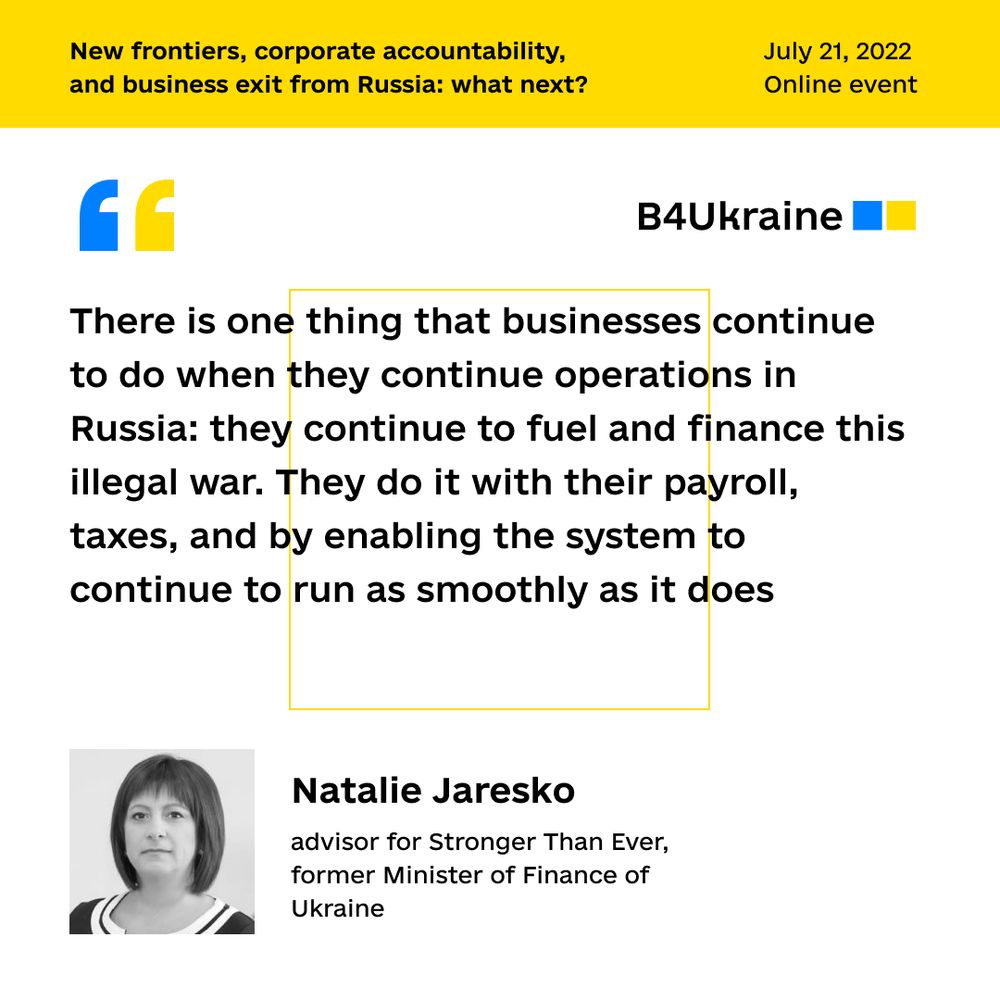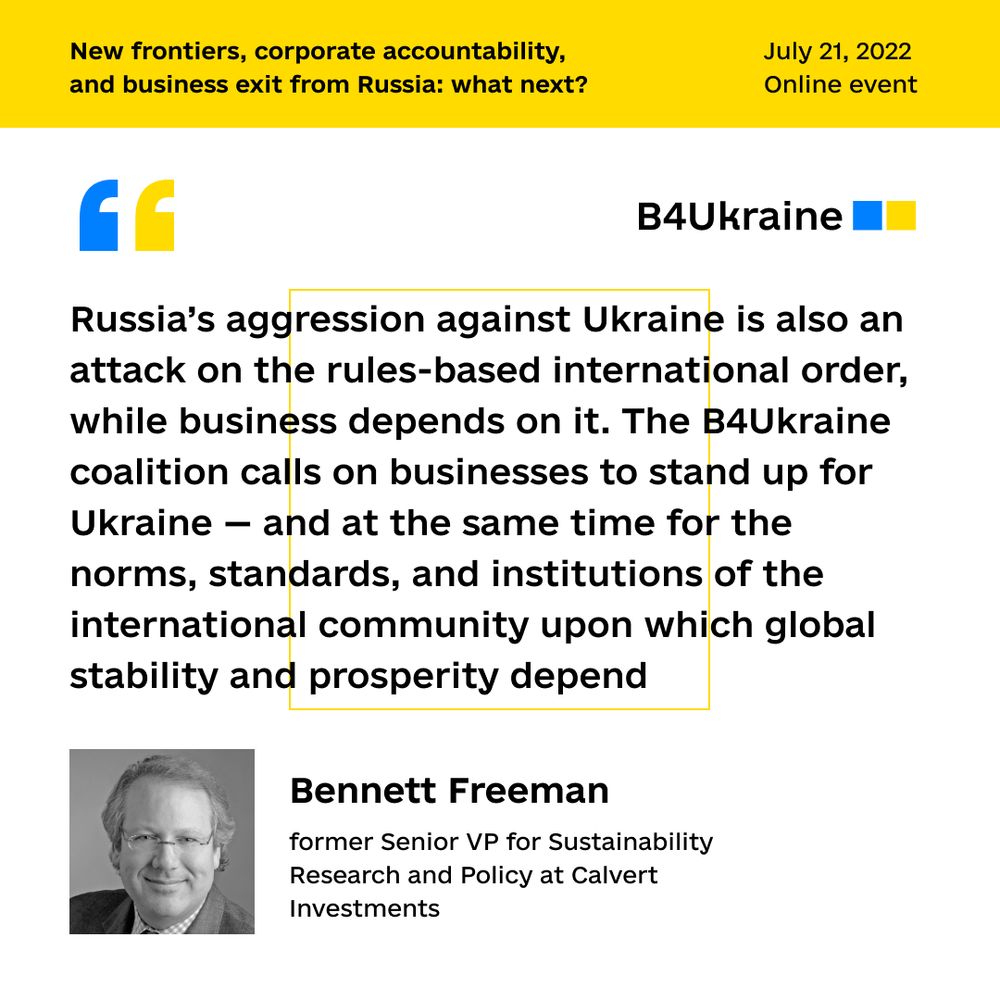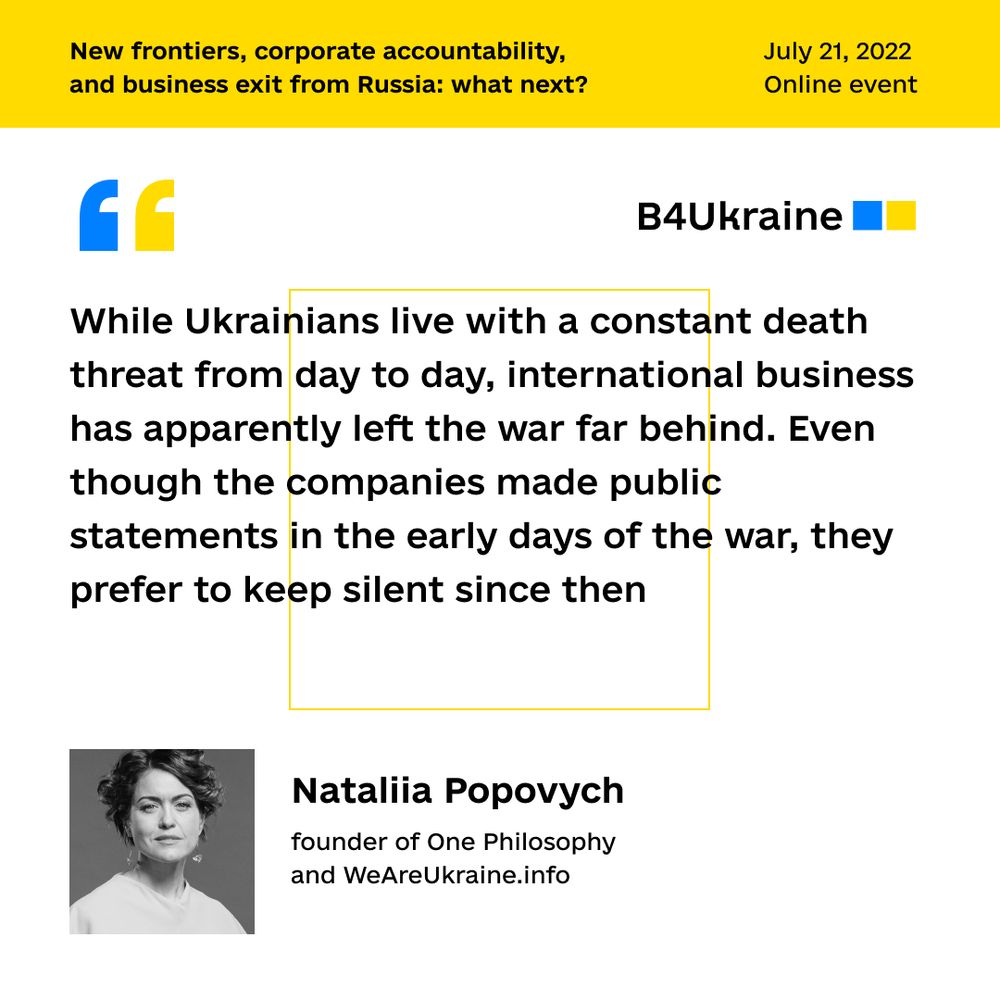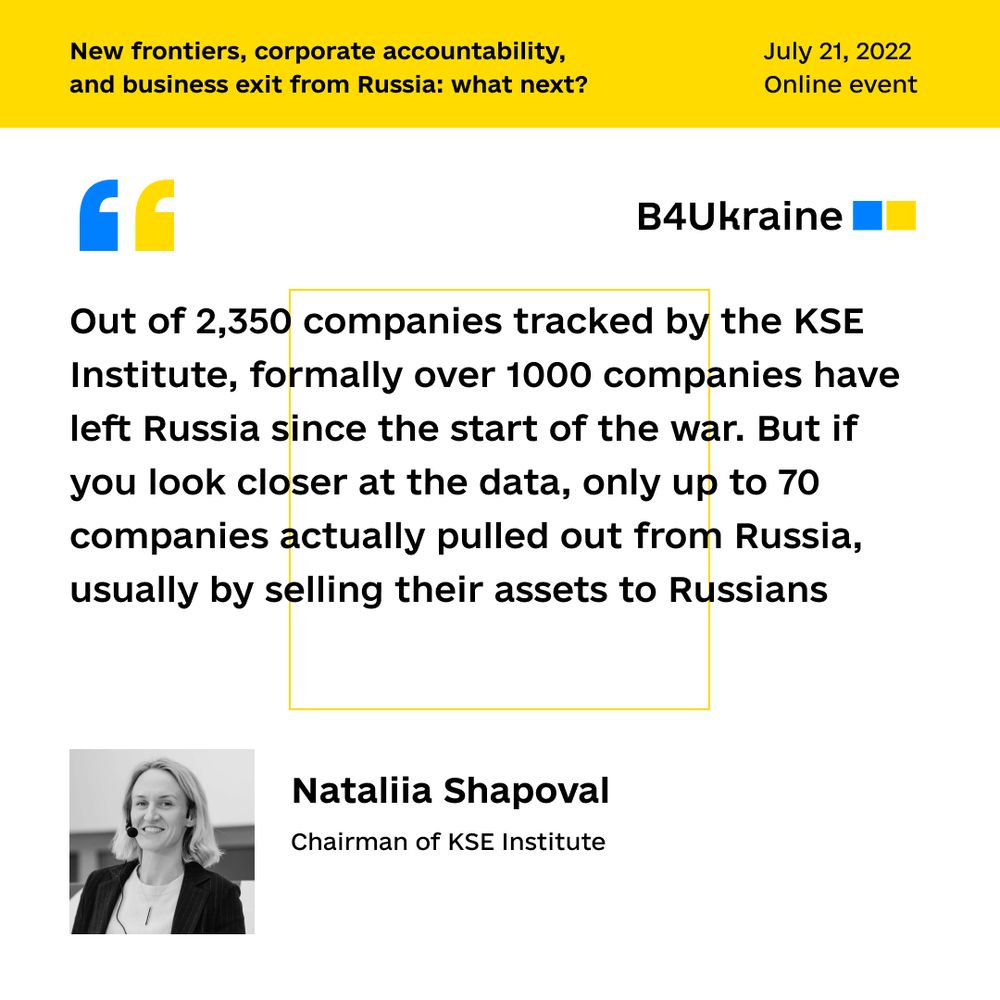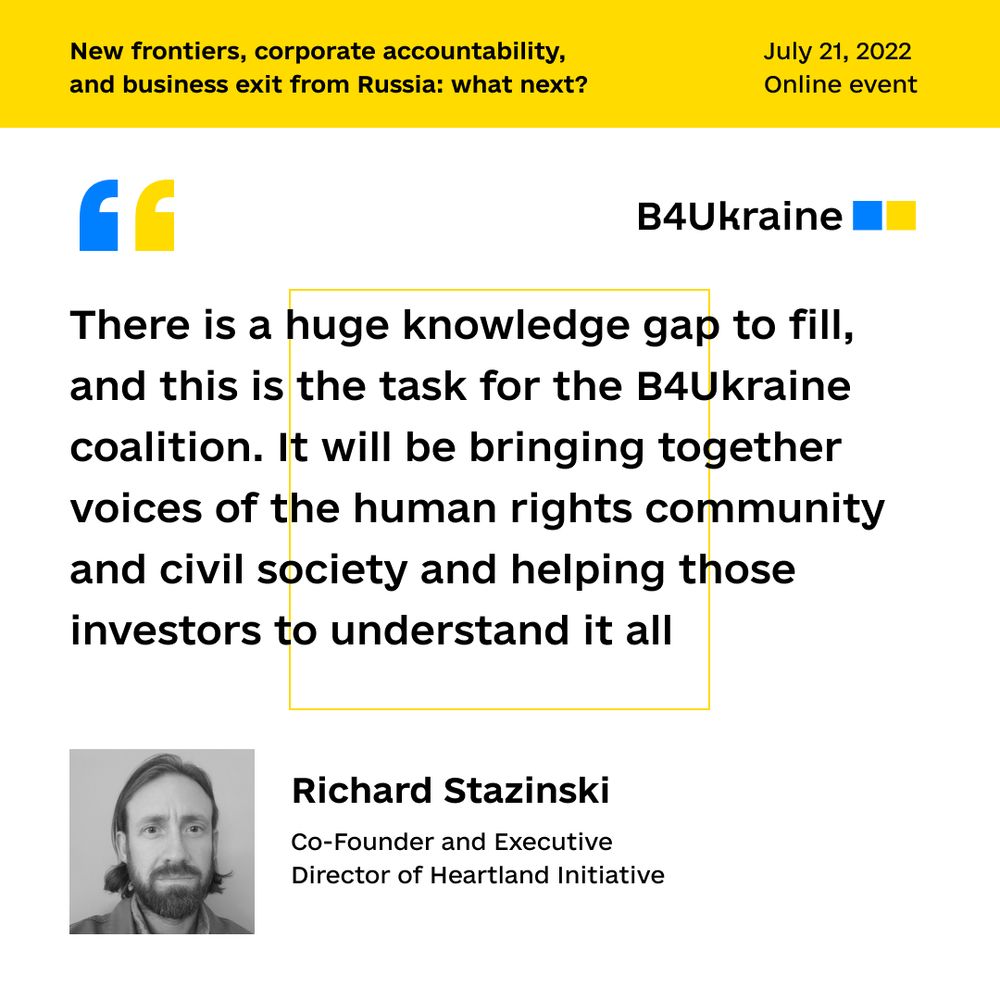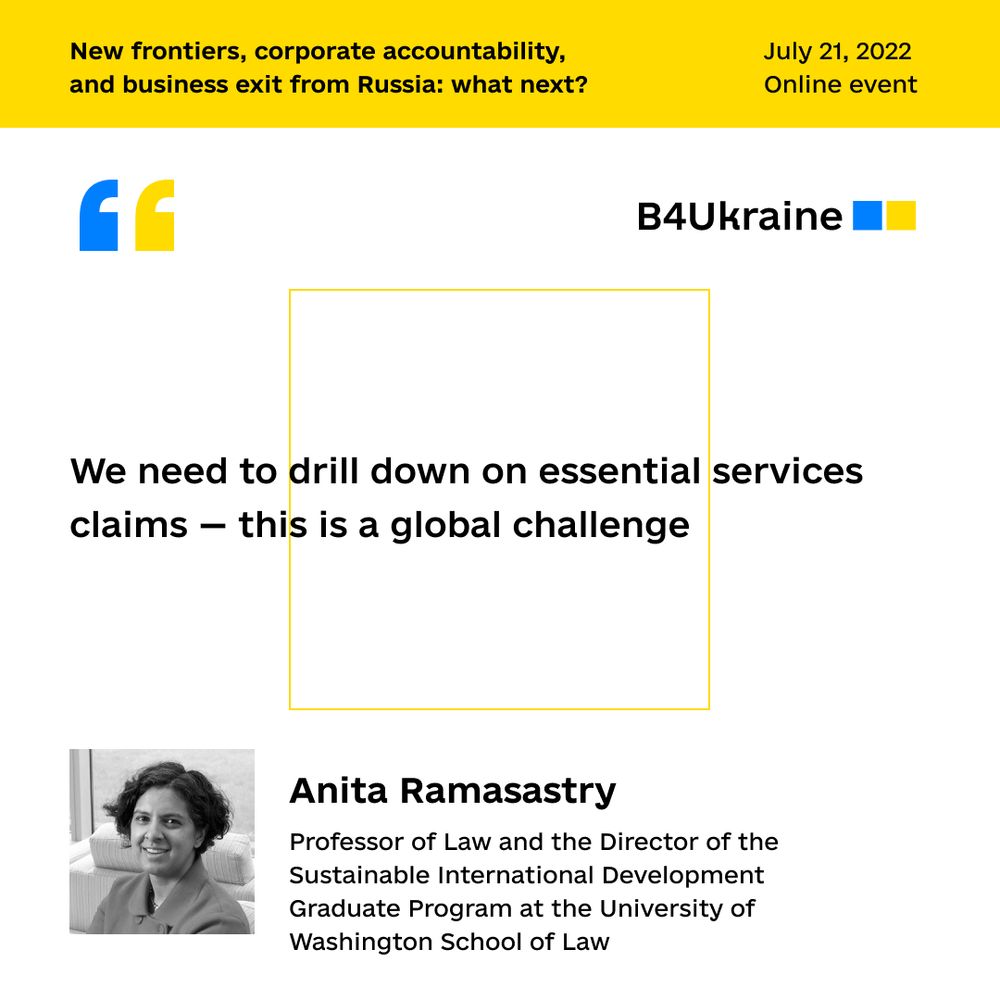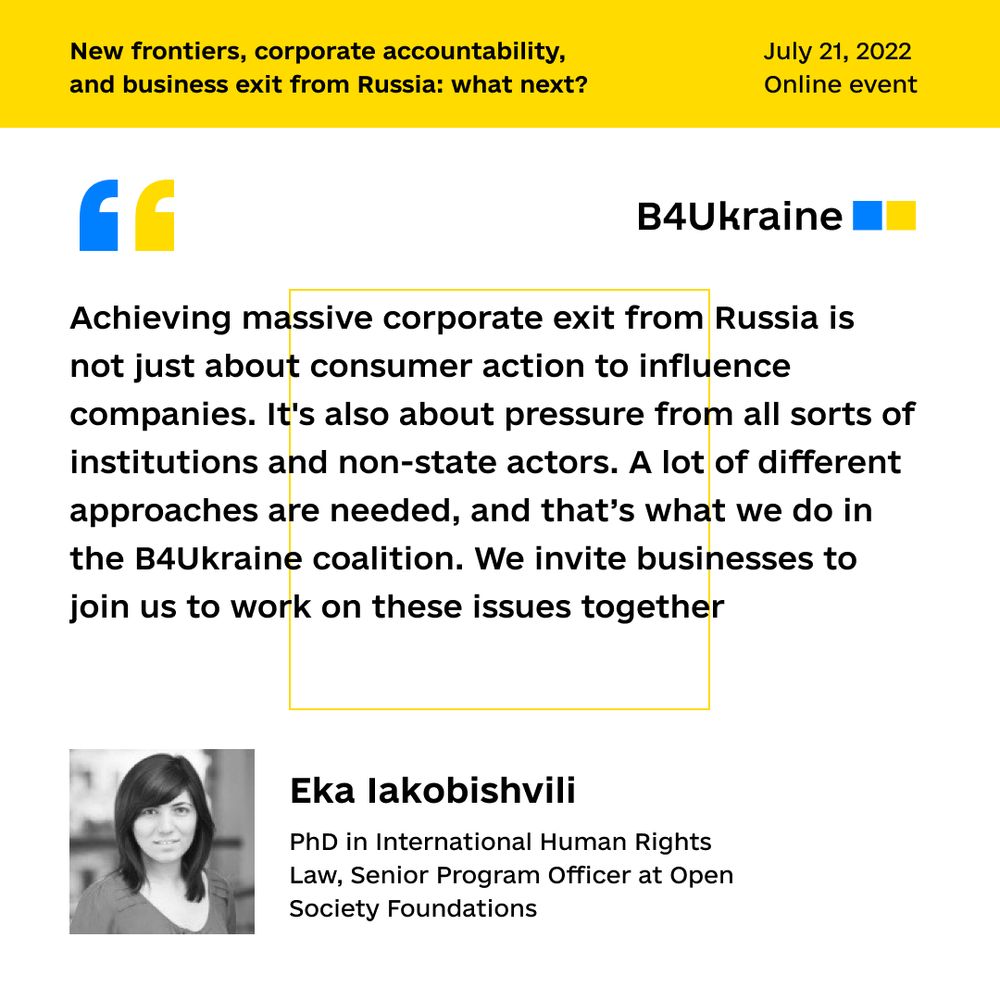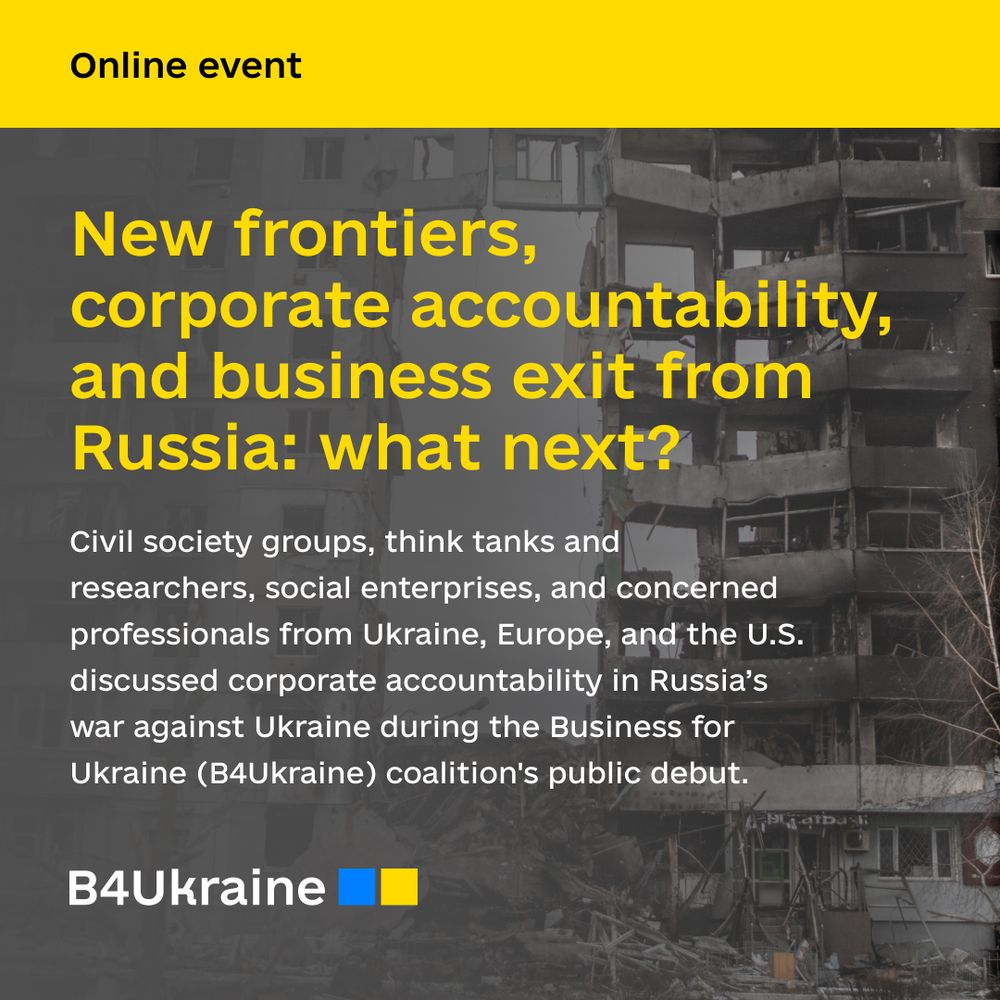
On February 24, 2022, Russia launched an unprovoked, full-scale war on Ukraine, which has resulted in thousands of civilian casualties, millions of refugees, and the large-scale destruction of Ukrainian cities and towns. In response, over one thousand private companies took steps to exit or suspend business activities in Russia. This unprecedented response from the business community made the headlines, but many questions remain as to companies’ ongoing relationships with the Russian state, oligarchs, and affiliated companies and the steps they must take to fully end their complicity with Russian aggression.
The Business for Ukraine coalition of Ukrainian and international civil society groups emerged to address these unresolved issues and contribute to the effort to restore Ukrainian sovereignty and advance accountability for Russia’s violations of international law. Together, members of the new coalition work to deprive Russia’s war machine of the financing and other resources it needs to conduct its unlawful war of aggression. They call on companies who have already cut ties with Russia to stand by those commitments until Ukraine’s territorial sovereignty within its internationally recognized borders is restored and accountability is imposed, and on those companies who have not yet left Russia to immediately do so.
Although the work towards the coalition’s goal has already begun in early spring, officially B4Ukraine was launched on July 21, 2022, with the ‘New frontiers, corporate accountability, and business exit from Russia: what next?’ online event. This session was the first in a series of events to bring together experts from Ukraine, the U.S., and Europe to discuss questions arising from the corporate exit from Russia and explore the central question of corporate accountability in Russia’s war against Ukraine.
“There is one thing that businesses continue to do when they continue operations in Russia: they continue to fuel and finance this illegal war. They do it with their payroll, taxes, and by enabling the system to continue to run as smoothly as it does,” stated Natalie Jaresko, advisor for Stronger Than Ever, former Minister of Finance of Ukraine, and the keynote speaker of the event.
According to Nataliia Shapoval, Chairman of KSE Institute, out of 2,350 companies tracked by the KSE Institute, formally over 1000 companies have left Russia since the start of the war. “But if you look closer at the data, only up to 70 companies actually pulled out from Russia, usually by selling their assets to Russians,” she said. Therefore, over a thousand, if not thousands of international companies keep operating in the aggressor country on a full or limited scale.
“While Ukrainians live with a constant death threat from day to day, international business has apparently left the war far behind. Even though the companies made public statements in the early days of the war, they prefer to keep silent since then,” emphasized Nataliia Popovych, founder of One Philosophy and WeAreUkraine.info. According to new research conducted by WeAreUkraine.info, silence is the preferred mode of communication for those companies that choose to continue doing business in Russia on a full or limited scale. Some 8 in 10 companies that are still operating in the aggressor country have kept silent about it. Only 2 in 10 companies communicated their decision to remain in Russia, and only 1 in 10 companies explained the reasons behind it.
One of the most popular excuses used by companies that keep operating in Russia is that they are providing Russians with essential goods and services. It is used especially widely among those operating in FMCG (Nestle, P&G, Auchan), food & beverages (Cargill, Barilla), pharma and healthcare (Pfizer, Sanofi), according to Nataliia Popovych. So far, such claims have not been sufficiently questioned.
“We need to drill down on essential services claims - this is a global challenge,” stressed Anita Ramasastry, Professor of Law and the Director of the Sustainable International Development Graduate Program at the University of Washington School of Law.
However, this is in businesses’ interest to ensure that the war in Ukraine ends sooner rather than later. “As the B4Ukraine Declaration states, Russia’s aggression against Ukraine is also “an attack on the rules-based international order.” Business depends on the rules-based international order — even if that dependence is not always acknowledged. The B4Ukraine coalition calls on businesses to stand up for Ukraine — and at the same time for the norms, standards, and institutions of the international community upon which global stability and prosperity depend,” commented Bennett Freeman, former Senior VP for Sustainability Research and Policy at Calvert Investments.
At the event, the experts discussed the need for international guidelines for companies and investors on how to conduct heightened human rights due diligence and operate within the human rights framework. First and foremost, the companies should ensure their alignment with the UN Guiding Principles on Business and Human Rights and OECD Guidelines for Multinational Enterprises. “The UN Guiding Principles ask companies to know what their connection to human rights harms are and to be transparent about their findings,” explained Anita Ramasastry.
However, trying to comply with the human rights guidelines, the companies face another challenge: balancing human rights issues across the aggressor country as well as Ukraine.
“The human rights of Ukrainians are being destroyed and abused in a way and a level that the very first goal needs to be not to apply rules in a standard way but to end the war. When the war ends, the human rights of everyone will be the most protected. In particular, the only way for Russians and those who live in the occupied territories to have their human rights really respected is to have this war end. To have this war end, there is a temporary time when in fact depriving money to the Russian government to continue this war is the absolute number one critical issue,” emphasized Natalie Jaresko.
In addition to the existing human rights framework, civil society can help businesses and investors to develop a more systemic approach to conflict-affected and high-risk areas, said Richard Stazinski, Co-Founder and Executive Director of Heartland Initiative.
“There is a huge knowledge gap to fill, and this is the task for the B4Ukraine coalition. It will be bringing together voices of the human rights community and civil society and helping those investors to understand it all,” Richard Stazinski added. Moreover, according to Bennett Freeman, a new geopolitical corporate responsibility should emerge to support the international rules-based order.
To contribute to this goal, the B4Ukraine coalition actively engages with civil society organizations, businesses, and investors to provide necessary information about the impact of operating in conflict-affected countries on them, their clients and stakeholders, and other parties involved.
“Achieving massive corporate exit from Russia is not just about consumer action to influence companies. It’s also about pressure from shareholders, trade unions, and all sorts of institutions and non-state actors. We need all these players to take action. A lot of different approaches are needed, and that’s what we do in the B4Ukraine coalition. We invite businesses to contact us and come on board to work on these issues together,” summed up Eka Iakobishvili, Doctor of Philosophy in International Human Rights Law, Senior Program Officer at Open Society Foundations.
For media inquiries, to support the Declaration, or to join the B4Ukraine coalition, contact us at contact@b4ukraine.org.
